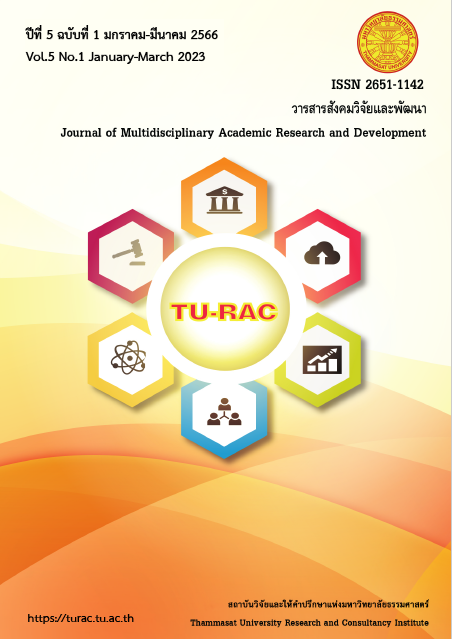Results of a development process of knowledge promotion instilling democratic behavior among elementary school students
Keywords:
Democracy, Elementary education, Learning outcome, Learning activitiesAbstract
This article is part of research developing a model of knowledge promotion and behavioral cultivation of democratic approaches for elementary school students. The goal was to study the results of using a democracy-promoting model at Nakhon Pathom kindergarten schools among 2,107 students from grades 1 to 6. The study was classified into three aspects: 1) inserting content on democratic methods of learning management; 2) comparing behavior before and after project implementation by knowledge test and behavioral assessment as educational instruments; and 3) studying satisfaction levels of students with organized learner development activities, with satisfaction assessment used as a data collection instrument.
Results were that in terms of the content-insertion process about democratic learning management methods, student knowledge levels about the democratic way of life increased at a statistical significance, while comparative behavior before and after project implementation showed that students had an increased democratic behavioral level in terms of dhamma, fellowship, and wisdom at a statistical significance of .00. Finally, student satisfaction findings indicated substantial overall satisfaction with all six programs as well as each individual program.
References
กระทรวงศึกษาธิการ. (2551). หลักสูตรแกนกลางการศึกษาขั้นพื้นฐาน พ.ศ. 2551. กรุงเทพฯ: โรงพิมพ์ชุมชนสหกรณ์การเกษตรแห่งประเทศไทย.
นฤมล แสงพรหม, รัชนีเพ็ญ พลเยี่ยม, ปาริชาติ ประเสริฐสังข์ และสุนันท์ สีพาย. (2562). การวิจัยและพัฒนาชุดกิจกรรมเพื่อส่งเสริมจิตพฤติกรรมประชาธิปไตยของนักเรียนชั้นประถมศึกษาปีที่ 6 ในจังหวัดร้อยเอ็ด. วารสารวิจัยและประเมินผลอุบลราชธานี. 8(2), 81-91.
บุญส่ง นิลแก้ว. (2541). วิจัยทางการศึกษา. คณะศึกษาศาสตร์ มหาวิทยาลัยเชียงใหม่.
ปริญญา ประจง, ศิริ เจริญวัย, ไพศาล หวังพานิช และจําเริญรัตน์ จิตต์จิรจรรย์. (2560). การพัฒนาหลักสูตรเพื่อเสริมสร้างพฤติกรรมประชาธิปไตย สำหรับกรรมการ สภานักเรียน ของโรงเรียนประถมศึกษา. วารสารบริหารการศึกษา มหาวิทยาลัยขอนแก่น. 13(1), 86-93.
พระราชบัญญัติการศึกษาแห่งชาติ ฉบับที่ 2 พ.ศ. 2545. (2545, 19 ธันวาคม). ราชกิจจานุเบกษา. เล่ม 119.
พระราชบัญญัติการศึกษาแห่งชาติ พ.ศ. 2542. (2542, 19 สิงหาคม). ราชกิจจานุเบกษา. เล่ม 116.
ภักดีกุล รัตนา. (2564). การจัดการศึกษาระดับปฐมวัยเพื่อความเป็นพลเมืองในโลกยุคดิจิทัล : บทเรียนจากต่างประเทศ. วารสารสังคมวิจัยและพัฒนา. 3(4), 1-23.
เมษิต กองเงิน. (2556). การพัฒนารูปแบบการบริหารกิจการนักเรียนที่ส่งเสริมคุณลักษณะเชิงพฤติกรรมด้าน ประชาธิปไตยของผู้เรียนในสถานศึกษาขั้นพื้นฐาน. วารสารวิชาการมหาวิทยาลัยอีสเทิร์นเอเชีย ฉบับสังคมศาสตร์และมนุษยศาสตร์. 3(1), 131-141.
รัฐธรรมนูญแห่งราชอาณาจักรไทย. (2560, 6 เมษายน). ราชกิจจานุเบกษา. เล่ม 134.
รุจิรวัทน์ ลำตาล. (2558). บทบาทสถาบันทางสังคมในการให้ความรู้ทางการเมืองการปกครองแก่นักเรียนชั้นมัธยมศึกษาปีที่ 6 อำเภอวังทอง จังหวัดพิษณุโลก. วารสารวิชาการ มหาวิทยาลัยกรุงเทพธนบุรี. 3(2), 52-61.
วิชัย มั่นพลศรี, ภูมิพงศ์ จอมหงษ์พิพัฒน์ และพจมาน ชำนาญกิจ. (2558). การพัฒนารูปแบบการจัดกิจกรรมเสริมสร้างพฤติกรรมประชาธิปไตย สำหรับนักเรียนระดับประถมศึกษา โดยการมีส่วนร่วม : กรณีศึกษาโรงเรียนบ้านท่าวัด “คุรุราษฎร์บำารุงวิทย์” สังกัดสำนักงานเขตพื้นที่การศึกษาประถมศึกษาสกลนคร เขต 1. วารสารศึกษาศาสตร์ ฉบับวิจัยบัณฑิตศึกษา. 9(3), 174-182.
สมรัก หอมทอง และนิลมณี พิทักษ์. (2552). การพัฒนาหน่วยการเรียนรู้พลเมืองดีตามวิถีประชาธิปไตย กลุ่มสาระการเรีนยรู้สังคมศึกษา ศาสนา และวัฒนธรรม โดยใช้แหล่งเรียนรู้ในชุมชน สำหรับนักเรียนชั้นประถมศึกษาปีที่ 5 โรงเรียนบ้านขามป้อมดงเย็น สำนักงานเขตพื้นที่การศึกษาขอนแก่น เขต 4. วารสารศึกษาศาสตร์ มหาวิทยาลัยขอนแก่น. 32(2), 104-111.
หมายจิต กฤตฤกษ์, อรชุน หวั่นอุทิศ และบุญจริยา เกตุอ่อน. (2559). การส่งเสริมวิถีประชาธิปไตยของนักเรียนมัธยมศึกษาตอนต้นในโรงเรียน วัดเสนาสน์ ตำบลท่างาม อำเภอวัดโบสถ์ จังหวัดพิษณุโลก. วารสารมหาวิทยาลัยพายัพ. 26(1), 91-106.
อรปวีณ์ นามสนิท และสมพงษ์ จิตระดับ. (2559). การวิเคราะห์เนื้อหาเรื่องประชาธิปไตยในกลุ่มสาระสังคมศึกษา ศาสนาและวัฒนธรรมในระดับประถมศึกษา. วารสารอิเล็กทรอนิกส์ทางการศึกษา. 11(4), 917-928.
อุดม อินทา, ณัฐรดา วงษ์นายะ และเจริญวิชญ์ สมพงษ์ธรรม. (2560). การพัฒนากลยุทธ์การดำเนินงานส่งเสริมประชาธิปไตยในสถานศึกษาสังกัดสำนักงานเขตพื้นที่การศึกษาประถมศึกษา จังหวัดกำแพงเพชร. วารสารวิชาการมหาวิทยาลัยการจัดการและเทคโนโลยีอีสเทิร์น. 16(2), 416-426.
Andriana, E. and Evans, D. (2020). Listening to the voices of students on inclusive education: Responses from principals and teachers in Indonesia. International Journal of Educational Research, 103, 101644. Doi: https://doi.org/10.1016/j.ijer.2020.101644.
Apergis, N. (2018). Education and democracy: New evidence from 161 countries. Economic Modelling. 71, 2018, 59-67. Doi: https://doi.org/10.1016/j.econmod.2017.12.001.
Atoche-Rodríguez, K. E., Salazar-Pastrana, A. and Durán-Pérez, A.M. (2016). Principals re-constructing their professional performance in elementary education. Journal of Behavior, Health & Social Issues. 8(1), 17-25. Doi: https://doi.org/10.1016/j.jbhsi.2016.10.001.
Dewey, J. (n.d.). Experience & Education. Retrieved November 30, 2020, from https://www.schoolofeducators.com/wp-content/uploads/2011/12/EXPERIENCE-EDUCATION-JOHN-DEWEY.pdf. Doi: https://doi.org/10.1016/j.sbspro.2015.01.703.
Hancock, D. R., Müller, U., Wang, C. and Hachen, J. (2019). Factors influencing school principals’ motivation to become principals in the U.S.A. and Germany. International Journal of Educational Research. 95(4), 90-96. Doi: https://doi.org/10.1016/j.ijer.2019.04.004.
Lee, A. N., Nie, Y. and Bai, B. (2020). Perceived principal's learning support and its relationships with psychological needs satisfaction, organizational commitment and change-oriented work behaviour: A Self-Determination Theory’s perspective. Teaching and Teacher Education. 93, 103076. Doi: https://doi.org/10.1016/j.tate.2020.103076.
Payne, K. A. Payne. (2017). Democratic teacher education in elementary classrooms – Learning about, through, and for thick democracy. The Journal of Social Studies Research. 41(2), 101-115. Doi: https://doi.org/10.1016/j.jssr.2016.07.001.
Yoldaş, Ö. B. (2015). Civic Education and Learning Democracy: Their Importance for Political Participation of Young People. Procedia - Social and Behavioral Sciences. 174, 2015, 544-549.
Downloads
Published
How to Cite
Issue
Section
License
Copyright (c) 2023 ยศยา กนกธัชปารมี

This work is licensed under a Creative Commons Attribution-NonCommercial-NoDerivatives 4.0 International License.



